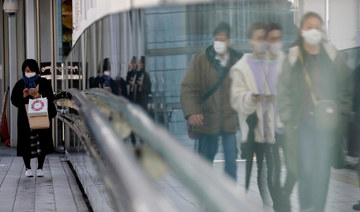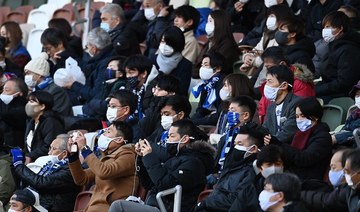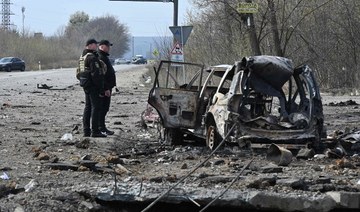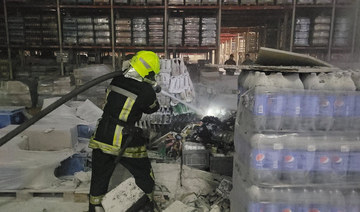TOKYO: Japan began vaccinating health care workers against the coronavirus on Wednesday, rolling out a cautious inoculation program with just over five months until the Tokyo 2020 Olympics.
Japan has so far approved only the Pfizer/BioNTech vaccine, and started administering the first shots at a Tokyo hospital on Wednesday morning.
Tokyo Medical Center director Kazuhiro Araki became the first person in Japan to receive the vaccine outside of clinical trials.
“The vaccine plays an important role in anti-coronavirus measures. So I thought as a director I should take the lead and get the shot,” he told reporters afterwards.
“I don’t like getting shots very much,” he admitted.
“But it wasn’t painful, so it was good. I was relieved.”
Nurse Rino Yoshida, wearing a face mask and visor, was calm and relaxed as she was vaccinated.
“The mortality rate and the risk of illness have gone down overseas, so hopefully vaccinations starting in Japan can change the situation here,” she told public broadcaster NHK.
Speaking afterwards, vice health minister Hiroshi Yamamoto told reporters he was “really moved” to witness the first shots being administered.
“I want to thank from the bottom of my heart the health care professionals who are working on the coronavirus frontline,” he added.
Twelve staff at the facility are being vaccinated on Wednesday, in front of the media, with a total of 800 in line to receive shots – including administrative personnel.
Japan is planning to initially vaccinate 40,000 health care workers across the country, and will study the effects of the two-dose vaccine on 20,000 of them.
Doses will be administered three weeks apart, with the people in the study group asked to keep daily records of any side effects or reactions, local media said.
The country then hopes to vaccinate around 3.7 million health workers from March – with jabs for around 36 million people aged 65 or older starting from April.
The program will extend later to those with pre-existing conditions or working with the elderly, and eventually to the general population, but there has been little detail yet on the timing for that.
Prime Minister Yoshihide Suga said Wednesday takes “seriously the fact that it has taken time” for Japan to start vaccinations compared to some other countries.
“But today we start, and it is the government’s responsibility to prepare the environment so that many Japanese people are vaccinated.”
Japan’s minister overseeing vaccinations Taro Kono told media on Tuesday there was no timeline yet for vaccinating the broader population.
He also acknowledged he had “no idea” how much of the population will be vaccinated by this summer’s postponed Olympics.
“I’m not really taking the Olympics into my consideration. I need to roll out the vaccine as I get the supply from Europe.”
Japan has reached deals with three major pharmaceutical firms to buy enough COVID-19 vaccine doses for its population of 126 million.
But so far only the Pfizer jab has been authorized, though AstraZeneca has submitted a request for approval.
Japan’s approval process has been slower than in some other countries because it has required additional domestic trials.
But the country has also seen a much more limited outbreak compared with hard-hit countries such as Britain or the United States.
It has recorded nearly 418,000 infections and just over 7,000 deaths so far.
A spike in cases late last year prompted the government to impose a state of emergency, currently in place in Tokyo and several other parts of the country until March 7.
The measure is limited, and primarily asks restaurants and bars to close by 8 p.m., with people urged but not ordered to stay at home.
Japan’s virus response is being closely watched with doubts still hanging over the feasibility of the Olympics, due to open July 23.
Organizers and officials have outlined virus countermeasures they say will keep the Games safe even without requiring participants to be vaccinated or quarantined on arrival.
Japan starts coronavirus vaccine rollout with health care workers
https://arab.news/95g74
Japan starts coronavirus vaccine rollout with health care workers
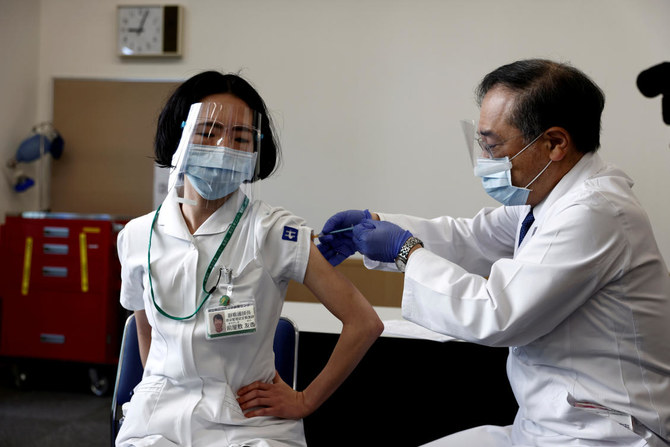
- Japan is planning to initially vaccinate 40,000 health care workers across the country
- Japan has deals with three major pharmaceutical firms to buy enough COVID-19 vaccine doses
India dismisses US human rights report as ‘deeply biased’
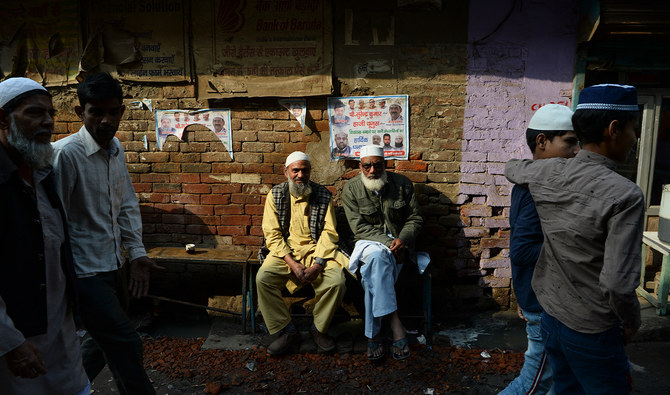
- Report found “significant” abuses in India’s Manipur state and attacks on minorities, dissenters
- India’s foreign ministry spokesperson says New Delhi does not attach any “value” to the report
NEW DELHI: New Delhi said on Thursday it does not attach any value to a US State Department report critical of human rights in India, and called it deeply biased.
The annual human rights assessment released earlier this week found “significant” abuses in India’s northeastern Manipur state last year and attacks on minorities, journalists and dissenting voices in the rest of the country.
Asked about it, Indian foreign ministry spokesperson Randhir Jasiwal told journalists on Thursday that the report “as per our understanding, is deeply biased and reflects a very poor understanding of India.”
“We attach no value to it and urge you to also do the same,” Jaiswal said.
Responding to a question about the growing protests on US university campuses against Israel’s offensive in Gaza that has killed more than 33,000 people, Jaiswal said that “there has to be the right balance between freedom of expression, sense of responsibility and public safety and order.”
He added that “democracies in particular should display this understanding in regard to other fellow democracies, after all we are all judged by what we do at home and not what we say abroad.”
While India and the US have a tight partnership, and Washington wants New Delhi to be a strategic counterweight to China, the relationship has encountered some minor bumps recently.
In March New Delhi dismissed US concerns over the implementation of a contentious Indian citizenship law, calling them “misplaced” and “unwarranted,” and objected to a US State Department official’s remarks over the arrest of a key opposition leader.
Last year Washington accused Indian agents of being involved in a failed assassination plot against a Sikh separatist leader in the US, and warned New Delhi about it.
India has said it has launched an investigation into Washington’s accusations but there has not been any update about the investigation’s status or findings.
Sweden to send NATO troops to Latvia next year: PM
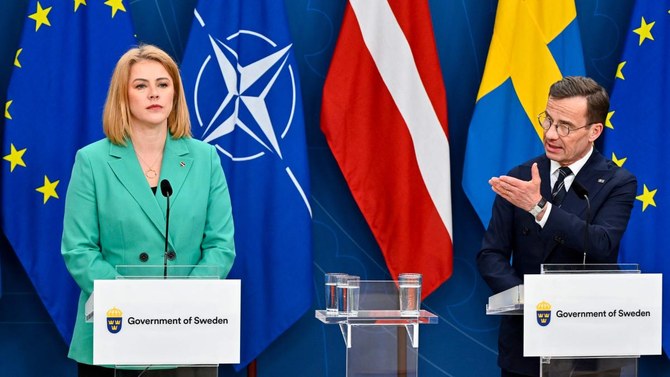
- The Swedish troop contribution was the first to be announced since the Scandinavian country joined NATO in March
- The battalion would be comprised of around 400 to 500 troops
STOCKHOLM: Sweden will next year contribute a reduced battalion to NATO forces in Latvia to help support the Baltic state following Russia’s invasion of Ukraine, Prime Minister Ulf Kristersson said Thursday.
The Swedish troop contribution was the first to be announced since the Scandinavian country joined NATO in March.
Kristersson had in January announced that Sweden would likely send a battalion to take part in NATO’s permanent multinational mission in Latvia, dubbed the Enhanced Forward Presence, aimed at boosting defense capacity in the region.
“The government this morning gave Sweden’s armed forces the formal task of planning and preparing for the Swedish contribution of a reduced mechanized battalion to NATO’s forward land forces in Latvia,” Kristersson told reporters during a press conference with his Latvian counterpart Evika Silina.
He said the battalion, which will be in Latvia for six months, would be comprised of around 400 to 500 troops.
“Our aim is a force contribution, including CV 90s armored vehicles and Leopard 2 main battle tanks.”
“We’re planning for the deployment early next year after a parliament decision,” he said.
UK police make fourth arrest after migrant deaths off France
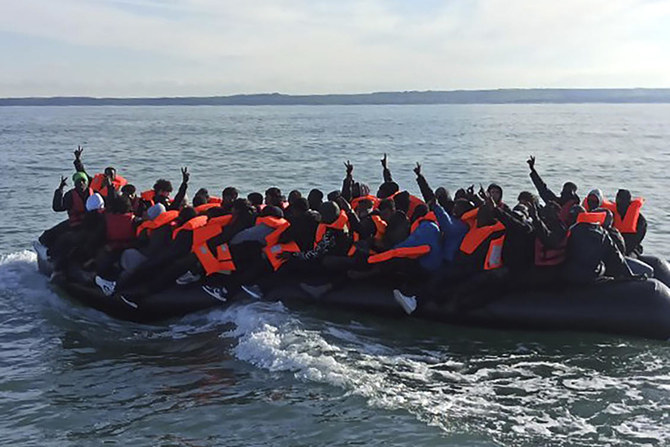
- NCA said it arrested an 18-year-old from Sudan late Wednesday on suspicion of facilitating illegal immigration and entering the UK illegally
- The latest arrest took place at Manston in Kent, southeast England, and the suspect was taken into custody for questioning
LONDON: UK police said Thursday that they had arrested another man after five migrants, including a child, died this week trying to cross the Channel from France.
The National Crime Agency (NCA) said it arrested an 18-year-old from Sudan late Wednesday on suspicion of facilitating illegal immigration and entering the UK illegally.
The arrest came as part of an investigation into the Channel small boat crossing which resulted in the deaths of five people on a French beach on Tuesday.
The NCA detained two Sudanese nationals aged 19 and 22, and a South Sudan national, also 22, on Tuesday and Wednesday, also on suspicion of facilitating illegal immigration and entering the UK illegally.
The 19-year-old has been released without charge, and is now being dealt with by immigration authorities, said the NCA.
The latest arrest took place at Manston in Kent, southeast England, and the suspect was taken into custody for questioning.
Three men, a woman and a seven-year-old girl lost their lives in the early hours of Tuesday in the sea near the northern French town of Wimereux.
They had been in a packed boat that set off before dawn but whose engine stopped a few hundred meters from the beach.
Several people then fell into the water. About 50 people were rescued and brought ashore but emergency services were unable to resuscitate the five.
Fifteen people have died this year trying to cross the busy shipping lane from northern France to southern England, according to an AFP tally.
That is already more than the 12 who died in the whole of last year.
Belgium summons Israeli ambassador over aid worker’s death
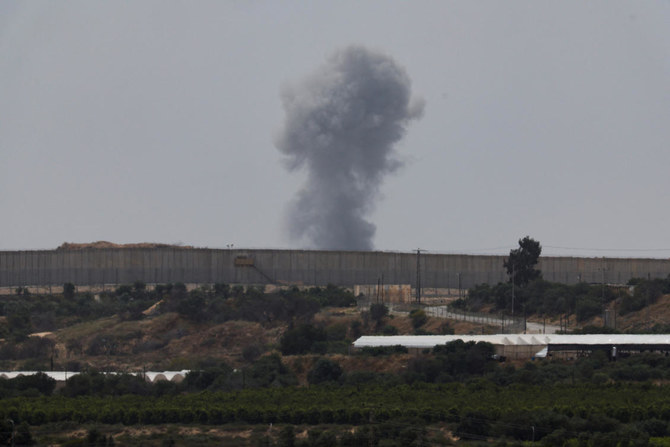
- Abdallah Nabhan, 33, along with his seven-year-old son, 65-year-old father, 35-year-old brother and six-year-old niece, were killed in Israel strike
- The airstrike hit the family home where 25 people were sheltering
BRUSSELS: Belgium said Thursday that it would summon Israel’s ambassador to explain the death in a Gaza airstrike of an aid worker with its Enabel development agency, as well as members of his family.
“Bombing civilian areas and populations is contrary to international law. I will summon the Israeli ambassador to condemn this unacceptable act and demand an explanation,” Foreign Minister Hadja Lahbib said on X.
Enabel said in a statement that Abdallah Nabhan, 33, along with his seven-year-old son, 65-year-old father, 35-year-old brother and six-year-old niece, were killed “after an Israeli airstrike in the eastern part of the city of Rafah.”
An Enabel employee & his family have been killed in Gaza. We express our solidarity with his family & colleagues.
— Hadja Lahbib (@hadjalahbib) April 25, 2024
Bombing civilian areas & populations is contrary to international law. I will summon the Israeli ambassador to condemn this unacceptable act & demand an explanation.
The airstrike hit the family home where 25 people were sheltering, including people displaced by the Israeli military operation in Gaza, Enabel said.
It said that Nabhan, who had worked on a Belgian development project helping young people find jobs, and his family were on a list Israel had of people eligible to exit Gaza, but that they were killed before being granted permission to leave.
Enabel’s chief, Jean Van Wetter, called their deaths “yet another flagrant violation by Israel of international humanitarian law.”
The health ministry in Gaza, run by the Hamas militant group, says more than 34,000 people have died in the war being waged in the Palestinian territory, most of them women and children.
Israel is conducting airstrikes and ground operations there in retaliation for a Hamas attack on October 7 that killed around 1,170 people in Israel, according to an AFP tally of Israeli figures.
Belgium, which currently holds the EU presidency, is among the European countries most vocal in condemning Israel’s operation as disproportionately deadly for Palestinian civilians.
Ukraine, Russia exchange fire, at least seven dead
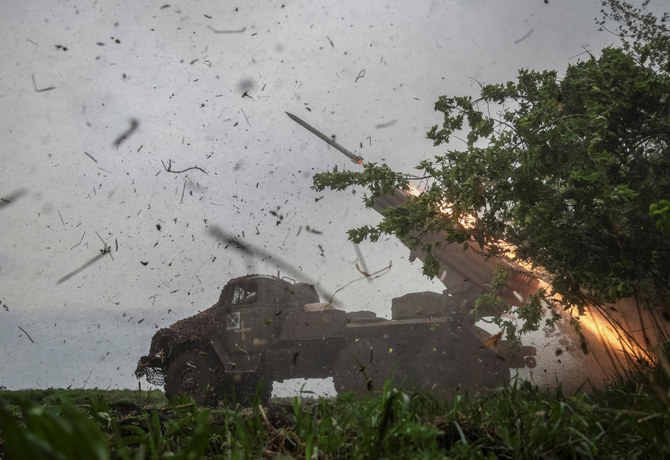
- The uptick in civilian deaths came as Russian forces are pressing in hard in the eastern Donetsk region of Ukraine
- A Ukrainian attack drone left two dead in Zaporizhzhia and two more were killed by Ukranian artillery fire in Kherson
MOSCOW: Ukrainian and Russian forces exchanged drone and artillery fire on Thursday, leaving at least seven dead, regional officials on both sides of the frontline announced.
The uptick in civilian deaths came as Russian forces are pressing in hard in the eastern Donetsk region of Ukraine, ahead of events in Moscow on May 9, hailing the Soviet Union's victory in World War II.
A Ukrainian attack drone left two dead in the southern region of Zaporizhzhia and two more were killed by Ukranian artillery fire in the southern Kherson region, officials said.
The Kremlin claimed to have annexed both regions in late 2022 even though Russian forces are still battling to gain full control over them.
"A man and a woman were killed as a result of a strike on a civilian car. Their four young children were orphaned," the Russian-installed head of Zaporizhzhia, Evgeny Balitsky, wrote on social media.
He said the children would be taken into care and provided with psychological assistance.
The Russian head of the Kherson region, Vladimir Saldo, said separately that two more people were killed by Ukrainian fire in the village of Dnipryany.
The two frontline regions saw intense bouts of fighting in 2022 and the summer of 2023, when Ukraine launched a counteroffensive that failed to meet expectations in Zaporizhzhia.
The brunt of the fighting has since moved to the eastern Donetsk region, which is also claimed by Moscow as Russian territory.
The Ukrainian head of the Donetsk region, Vadim Filashkin, said three people had been killed in separate bouts of shelling in the villages of Udachne, where two people were killed, and in Kurakhivka, where one person was killed.
"The final consequences of the shelling have yet to be determined," he said.



